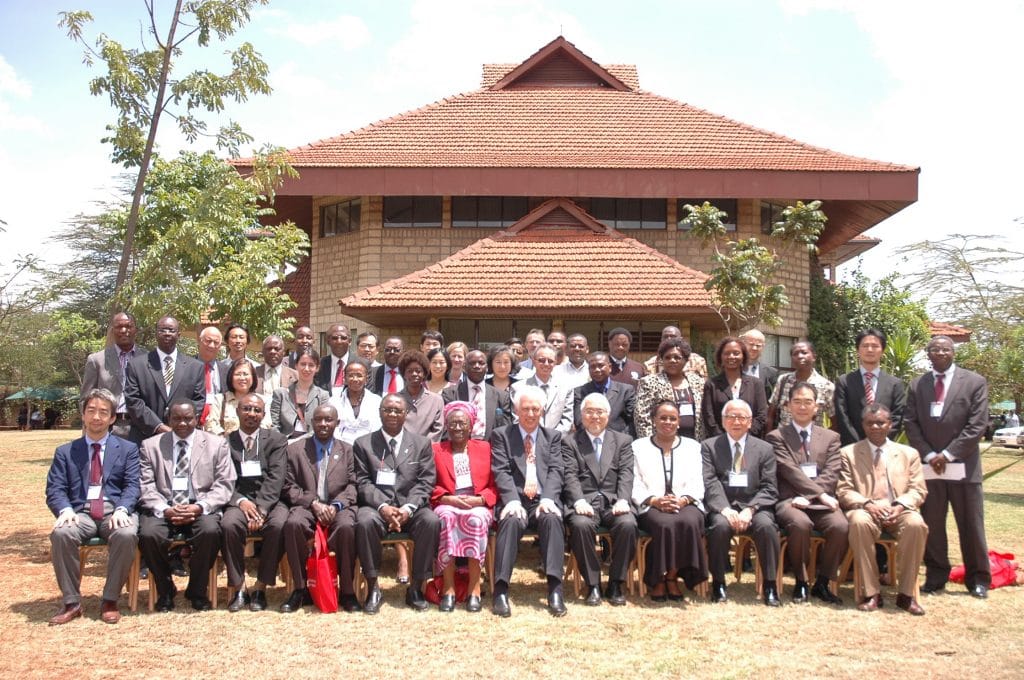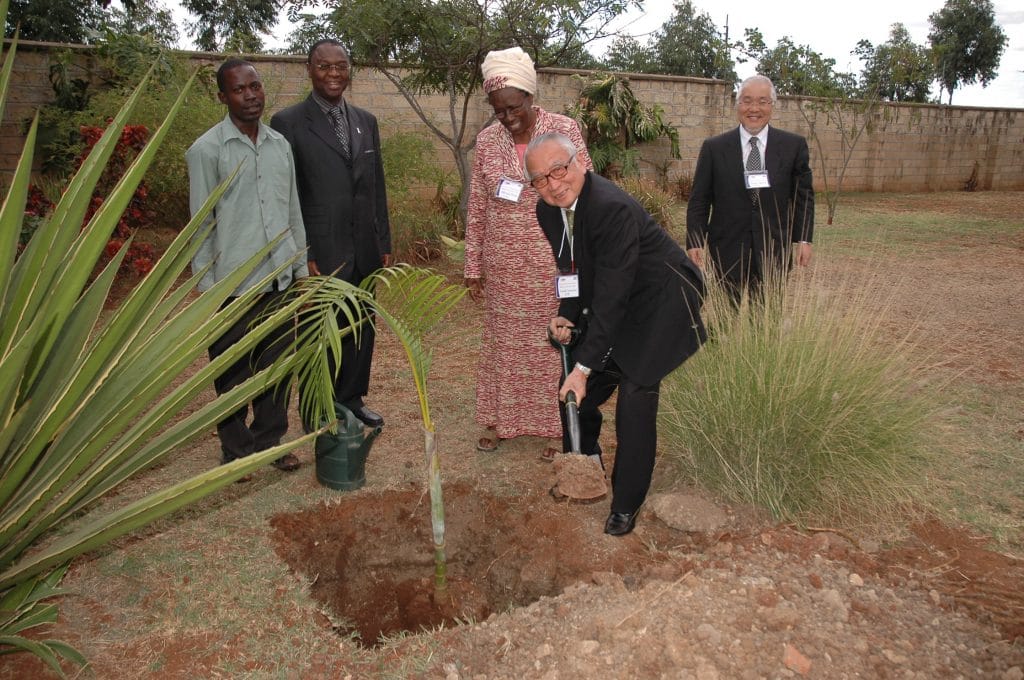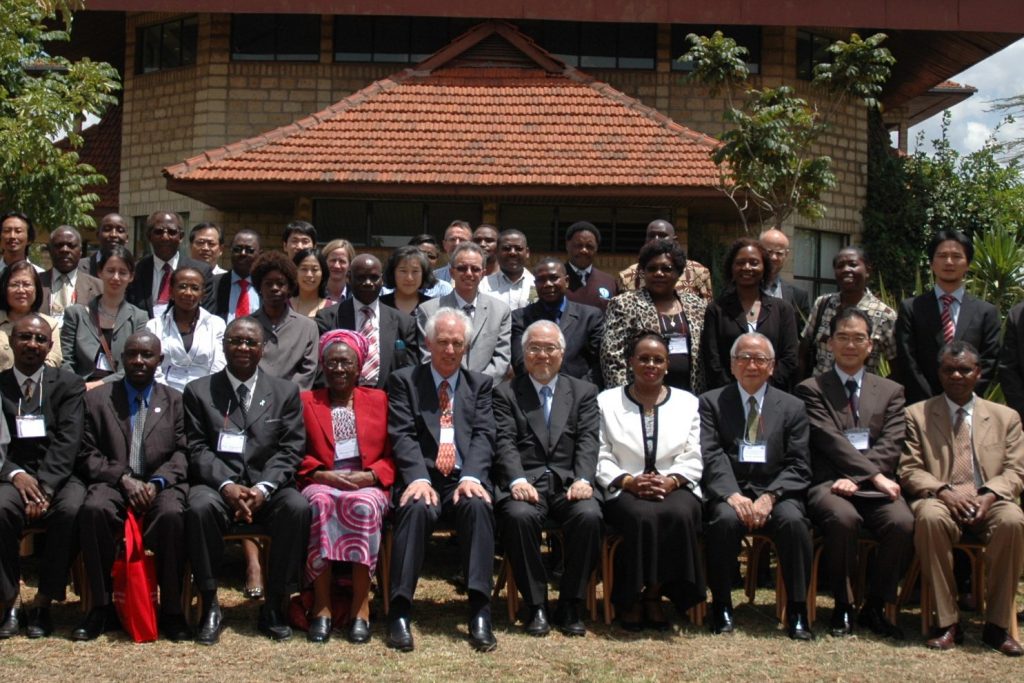A dissemination seminar for JCIE’s report on Global Action for Health System Strengthening was held in Nairobi, in collaboration with the African Medical and Research Foundation (AMREF), on April 17–18, 2009. The seminar brought together practitioners and other experts on global health challenges in Africa from Cameroon, Ghana, Kenya, South Africa, Zambia, and Zimbabwe to discuss the appropriateness of the recommendations in their own settings, their feasibility, challenges to implementing them, and examples of existing efforts to address global health challenges through the framework outlined in the report.
One common thread that flowed through both days of the discussion was the importance of community, not only as the endpoint of global health policymaking and investment but as the starting point and driving force behind health-related decision making. This focus on the community fits well with Japan’s emphasis on human security, which JCIE has helped develop as a concept and approach, and many of the participants agreed that the work they are doing in Africa can be described as human security even if they have not necessarily used that term in the past. As one speaker noted, the community is where things happen in Africa, so only those programs that emphasize the community level will have any chance of success. At the same time, there was some caution voiced against an exclusive emphasis on the community level in decision making because of potential bias and the fact that some important growing health challenges, such as hypertension, do not necessarily exhibit symptoms and, therefore, might be overlooked in a solely community-based approach to health-related decision making.


The participants also challenged several common representations of health systems. One is the pyramid that is often used to illustrate various roles within a health system. Generally, these pyramids put actors at the community level, which make up the widest section of the pyramid, at the bottom with those in the narrowest section—central-level decision makers, specialists, tertiary-care facilities—at the top. But, many of the participants advocated “flipping the pyramid over” so that the community level is always at the top. Many of the speakers also proposed a seventh building block to be included among the blocks that the WHO has identified as essential elements of a health system—the community or beneficiaries. They argued that this is the most important building block because without it, the rest would be moot.
Speakers throughout the seminar offered successful localized examples of truly community-based approaches that engaged community members in identifying needs and responses, designing activities, implementing projects and programs, monitoring and evaluating their efforts, and extracting lessons from their experience. But, scaling up these kinds of approaches has proven challenging, and there was general consensus that the global health community as a whole has yet to develop strategies for engaging communities in such areas on a larger scale.
Another common theme throughout the seminar was the quest for more synergy between efforts aimed at fighting particular diseases and those aimed at strengthening health systems more broadly. Programs targeting particular diseases have been successful at saving lives throughout Africa that otherwise would not have been saved, considering the weak health systems in many countries and the high cost of treating and preventing the major communicable diseases. But, these programs are inhibited by weaknesses in the health systems throughout Africa, and some argue that the programs themselves actually contribute to a further weakening of health systems. Regardless of whether one agrees with that assessment or not, it is clear to those working at the community level that comprehensive approaches that reflect the complex nature of human beings are needed in order to keep communities healthy. Several of the representatives from disease-specific programs discussed their own agencies’ efforts to take a more comprehensive approach without sacrificing the important impact they are having on addressing the major communicable diseases.
There was also a discussion on whether donors should invest resources in pilot projects in limited, priority areas in order to gain better knowledge of what does and does not work before scaling up efforts to reach a wider target group, or if resources should be spread more evenly to limit unhealthy competition and the perception of donor favoritism. While the seminar participants did not come to any conclusion on this debate, it is clear that it will continue to become even more critical in the global health discourse as the global financial crisis takes its toll on national and nongovernmental budgets and all stakeholders look for ways to use limited resources more efficiently and effectively.
Organizations throughout Africa, including those represented at the seminar, encounter the challenges of strengthening health systems on a daily basis and have learned numerous lessons on what does and does not work, particularly in the areas of health workforces and health information. The Japanese government has made commitments in both of these areas, but it, like many donors, is still struggling with how to go about moving from commitment to action. Those experts taking part in the seminar offered their own support and that of their colleagues in helping Japan design effective responses to these challenges in Africa.
April 17
OPENING SESSION
Welcome
Michael Smalley, Director General, African Medical Research Foundation (AMREF)
Opening remarks
Tadashi Yamamoto, President, Japan Center for International Exchange (JCIE); Director, Working Group on Challenges in Global Health and Japan’s Contributions (Takemi Working Group)
Overview
Keizo Takemi, Research Fellow, Harvard School of Public Health; Chair, Takemi Working Group; Senior Fellow, JCIE
=Keynote speeches
Miriam Were, Laureate, Hideyo Noguchi Africa Prize; Member of the International Advisory Board on Global Action for Health System Strengthening
Peter Anyang’ Nyong’o, Minister for Medical Services, Kenya
Fru Angwafor III, Permanent Secretary of the Ministry of Health, Cameroon
SESSION 1: Presentation by the Task Force on Global Action for Health System Strengthening
Moderator
Tadashi Yamamoto
Panelists
Keizo Takemi
Kenji Shibuya, Professor, Department of International Health Policy and Planning, Graduate School of Medicine, University of Tokyo, Japan
Hajime Inoue, Director, Office of International Cooperation, Ministry of Health, Labour and Welfare, Japan
Comments
James Christopher Lovelace, Principal Health Specialist, Africa Region and Country Manager for Somalia, World Bank
Michael Smalley, Director General, AMREF, Kenya
Michael Johnson, Deputy Director, Fogarty International Center, US National Institutes of Health
SESSION 2: Opportunities and Challenges for Implementing the Recommendations in Africa
Moderator
Florence Muli-Musiime, Deputy Director-General, AMREF
Panelists
Alex Nazzar, Director for Policy Research and Evaluation and Deputy Executive Director, Centre for Health and Social Services, Ghana
Rene Loewenson, Director, Training and Research Support Centre (TARSC); Coordinator, Southern African Network on Equity in Health (EQUINET)
Eric Buch, NEPAD Health Advisor
Peter Ngatia, AMREF Director of Capacity Building
SESSION 3: Responses from Donor Agencies
Moderator
Keizo Takemi
Panelists
Katherine Bond, Associate Director, Rockefeller Foundation
Anthony Seddoh, Global Fund to Fight AIDS, TB and Malaria
David Haroz, Senior Associate for Policy and External Relations, US President’s Emergency Plan for AIDS Relief (PEPFAR), Kenya
Ikuo Takizawa, JICA Regional Support Office for Africa
CONCLUDING SESSION: Responses from the Task Force
Keizo Takemi
Kenji Shibuya
Concluding remarks
Tadashi Yamamoto
April 18
OPENING SESSION
Opening remarks
Keizo Takemi, Chair, Working Group on Challenges in Global Health and Japan’s Contributions (Takemi Working Group); Senior Fellow, Japan Center for International Exchange (JCIE)
Presentation on Preliminary Future Strategy
Kenji Shibuya, Professor, Graduate School of Medicine, University of Tokyo; Director, Research Team on Health Information, Task Force on Global Action for Health System Strengthening
SESSION 1: Assessment of Health Information Systems in Africa at the District, Country, and Regional Levels
Moderator
Thomas Nzioki Kibua, Theme Director, Health Policy & Systems Research, African Medical and Research Foundation (AMREF), Kenya
Presentations
Eliya Zulu, Deputy Director and Director of Research, African Population and Health Research Centre (APHRC)
Mette Kjaer, AMREF
SESSION 2: Better Health Information for Better Health Outcomes: Perspectives from the Community
Moderator
Rene Loewenson, Director, Training and Research Support Centre (TARSC); Coordinator, Southern African Network on Equity in Health (EQUINET)
Presentations
Tanzania Essential Health Interventions Project (TEHIP)
Graham D. F. Reid, Senior Program Specialist on Health, International Development Research Centre, Nairobi, Kenya
Lusaka’s case
Clara Mbwili-Muleya, Programme & Planning Manager, Lusaka District Health Management Team, Ministry of Health, Zambia
SESSION 3: What Incentive Mechanisms should be Enhanced for Sharing Learning Processes from the Community to the Regional Levels?
Moderator
Kenji Shibuya
Panelists
Katherine Bond, Associate Director, Rockefeller Foundation
Anthony Seddoh, Global Fund to Fight AIDS, TB and Malaria
David Haroz, Senior Associate for Policy and External Relations, US President’s Emergency Plan for AIDS Relief (PEPFAR), Kenya
Ikuo Takizawa, JICA Regional Support Office for Africa
SESSION 4: How the G8 Countries and Other Donors Can Facilitate the Joint Learning Process
Panelists
Chris Mwikisa, Director, Health Systems and Services Development Division, WHO African Regional Office (AFRO)
Ikuo Takizawa, JICA Regional Support Office for Africa
Wrap-up
Final remarks: Kenji Shibuya

